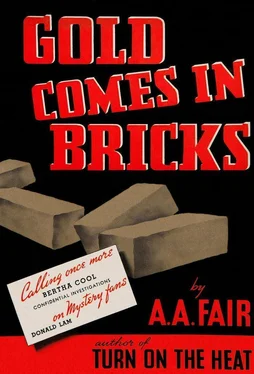“Your three minutes are up,” I said.
“I understand, Mr. Fischler. I have perhaps trespassed upon your time and your good nature, but so great is my anxiety to see that you yourself—”
“How much,” I asked cautiously, “is it going to cost?”
“That is entirely up to you, Mr. Fischler. If you wish to make a hundred thousand dollars, your investment can be relatively small. If you will be content with five hundred thousand, you can make a moderate investment. If you wish to be swept on into power as a multi-millionaire, it will cost you more.”
“How much,” I asked, “to be a multi-millionaire?”
“Five thousand bucks,” he said without batting an eye.
“How do you figure it?”
“Well, to begin with, there are these vast acres.”
“Never mind going over that again,” I said. “Let’s get down to brass tacks.”
“What do you want to know?”
“What are your shares of stock worth?”
“One hundred and fifty-seven times what we are asking for them,” he said.
“Into what units is your stock divided?”
He jerked a billfold from his pocket, tapped the desk with it impressively. “Mr. Fischler, when the Foreclosed Farms Underwriters Company was established, it was an agricultural enterprise launched in the midst of a vast business depression which had for its primary object the redemption of lands which had been foreclosed in mortgage sale. Therefore, the corporation had a low capitalized stock valuation. Now that this vast new enterprise has developed, the logical thing to do would be to increase our stock capital by one thousand per cent. In other words, a share of stock which had a previous par value of one dollar should be split up into one thousand shares of stock, each of one dollar valuation. It would be readily possible to do this, but in order to accomplish it, there would be legal difficulties, a lot of red tape, incidental delays, and the making of profit for our stockholders would be delayed just that much.
“It is the policy of our directors — young vigorous men, broad-minded, aggressive, and determined — to cut away all of this red tape, to rush into production in order that our stockholders can start enjoying their profits almost immediately.”
“How much would I get for five hundred dollars?”
“You would get one share of stock. The par value would be one dollar. The actual value right today would in all probability be five thousand dollars. Within sixty days, you can doubtless sell it for ten thousand five hundred dollars. At the end of a year, that stock will be worth one hundred thousand dollars.”
I squinted my eyes thoughtfully. He knew then the time had come to close, and, good salesman that he was, he withdrew discreetly to the background so that I could let the details soak in.
“I haven’t much money now,” I said. “In about thirty days, I expect to have a lot more money.”
“In thirty days,” he said, “the stock will, of course, have increased in value, but it will still be a marvellous investment.”
“Look here,” I said, “could I buy five hundred dollars’ worth of stock, and then get an option on a large block of stock by paying another five hundred dollars?”
“I’d have to take it up with the main office,” he said. “That’s rather unusual. You can see what that would mean, Mr. Fischler. If you tied up a block of stock for only five hundred dollars, you could sell out within a week for a respectable profit. Inside of thirty days, you could probably realize twenty thousand dollars for your five hundred dollar option.”
“That’s the way I want to do it,” I said.
“But have you considered the possibility of going to a bank, Mr. Fischler, and—”
“I’ve made my proposition,” I said.
“I understand. But, Mr. Fischler, the situation is this. Our board of directors have to be scrupulously fair. They have other investors to consider. Many persons have bought—”
“You heard my proposition,” I said. “You’ve used up your time allowance. I’m familiar with what you have to offer. I don’t want to waste time in an argument.”
“How big a block of stock would you want to tie up in that option?”
“In thirty days,” I said, “I’m going to have a hundred thousand dollars to invest. I’m not going to put all of my eggs in one basket. Fifty thousand dollars is the limit I’ll put in your company. I’ll put up five hundred dollars now to show my good faith, and I want you to tie up a block of stock which, selling at present prices, will be what I can buy for fifty thousand dollars.”
“I’ll see what I can do, but would it be possible for you to consider—”
“No,” I interrupted, and got up out of my chair. “I’m a busy man, Mr. Rich.”
“I understand, but please remember that I am here offering you a sincere service. The minutes which you have so generously given me will bear you golden dividends out of all proportion—”
“You have my proposition. The quicker you get it to your board of directors, the quicker you can give me an answer.”
I walked over and held the door open.
He looked at me curiously for a minute, then shot out his hand. “Mr. Fischler,” he said, “permit me to congratulate you on having made one of the most momentous decisions of your entire business career — and also upon having put across the shrewdest, most far-sighted financial deal of any prospect upon whom I have called. I’ll give you a ring this afternoon.”
I stood in the door and watched him cross the outer office and leave through the entrance door.
Elsie Brand looked up. “Gosh, what a line,” she said.
“Could you hear it?”
“Not the words, but you could hear his voice pouring out through the cracks around the office door.”
I said, “Get me Henry C. Ashbury on the line. You’ll find him listed in the telephone book. Don’t try his residence. Get his office.”
I went back and sat down at the desk. Ashbury came on the phone in about thirty seconds, and I said, “Hello, Ashbury. You know who this is talking?”
“No.” His voice was close-clipped and decisive as though he didn’t like riddles over the telephone, and was ready to hang up.
“Your physical instructor.”
“Oh, yes.” His voice changed.
“Would it inconvenience you,” I asked, “if your stepson went to jail for crooked promotion?”
“If my — good God, Donald, what are you talking about?”
“About whether it would inconvenience you if your stepson went to jail for crooked promotion.”
“It would be disastrous. It would be—”
“Is it possible,” I asked, “that you have watched him being promoted to the position of president, without realising that he was simply being pushed out in front?”
“Good God!”
I hung up the telephone.
I paused in the outer office long enough to say to Elsie Brand, “I’m going over to Bertha Cool’s office to tell her she’ll have to get another secretary.”
She smiled. “Bertha will have kittens.”
“That’s fine. In about an hour Mr. Rich will call to tell me that he’s managed to get my proposition through for immediate action, but that he can’t hold it open longer than two or three o’clock this afternoon, that I’ll have to get the money and have it ready in the office, and he’ll be here with contracts to sign. Make an appointment for whatever time he says, and call me at Bertha Cool’s office to let me know.”
“Anything else?” she asked.
“If a Mr. Ashbury should call or come in, tell him Mr. Fischler is busy and you don’t know just when he’ll be back.”
I’d become so accustomed to hearing the rapid fire of Elsie Brand’s typewriter when I opened the door of the agency office that the ragged tempo of click — clack — clack — clack — click — clack — clack sounded strange to me as I walked down the corridor, and made me pause to convince myself that I had the right office.
Читать дальше












